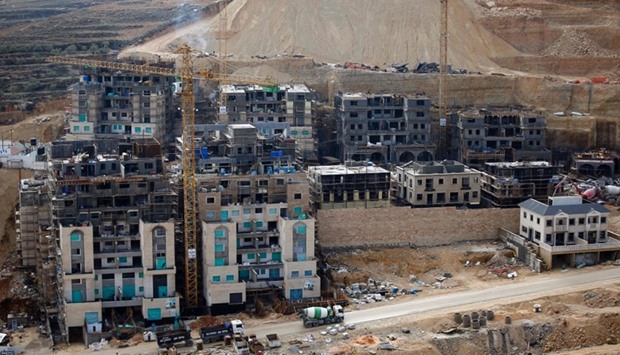But while a Jerusalem planning committee postponed the request for building permits for nearly 500 homes, it did grant approval for a highly controversial settler building in east Jerusalem, according to the Ir Amim NGO.
The four-storey building is in Silwan next to Jerusalem's Old City and the site of a long campaign by pro-settlement groups to expand the Israeli presence there.
Discussion on the hundreds of other homes was pulled from the agenda in a move following last week's UN Security Council resolution demanding a halt to Israeli settlement building.
It also came with Kerry set to make a major speech in Washington on the Israeli-Palestinian conflict at 1600 GMT.
Hanan Rubin, a Jerusalem city councillor and a member of the planning committee that was to discuss the permits, told AFP its members had been informed of Netanyahu's request by the committee chairman.
"We were told by the chairman... that it was pulled at the request of the prime minister so we can avoid a conflict with the US government just before Kerry's speech tonight," Rubin said.
Netanyahu's spokesman declined comment.
Rubin said the committee had been planning to vote on permits for 492 units in the Ramat Shlomo and Ramot settlement neighbourhoods of mainly Palestinian east Jerusalem.
He said the plans would be brought forward at a later date, though it was unclear when.
Furious reaction
Friday's UN Security Council resolution demanded a halt to Israeli settlement building in Palestinian territory. It passed 14-0, with the United States abstaining.
By declining to use its veto, Washington enabled the adoption of the first UN resolution since 1979 to condemn Israel over its settlement policy.
Netanyahu reacted furiously, accusing US President Barack Obama's administration of being behind the resolution and vowing not to abide by it.
US President-elect Donald Trump, who takes office on January 20, has signalled a far more favourable policy towards Israel and called for the US to veto the resolution.
"We cannot continue to let Israel be treated with such total disdain and disrespect. They used to have a great friend in the US, but..." he wrote on Twitter on Wednesday.
"Not anymore. The beginning of the end was the horrible Iran deal, and now this (UN)! Stay strong Israel, January 20th is fast approaching!"
Netanyahu tweeted his thanks, saying: "President-elect Trump, thank you for your warm friendship and your clear-cut support for Israel!"
Israel's right-wing has welcomed Trump's election, with key members of Netanyahu's coalition calling for an end to the idea of a Palestinian state, the basis of years of negotiations.
Kerry's upcoming speech has led to further concern in Israel, with officials fearing he could lay out parameters for restarting long-stalled peace efforts that they oppose.
Beyond that, plans by France to hold an international Middle East peace conference on January 15 is another point of worry for Israel.
Officials are concerned that Kerry's speech and the conference could lead to further action against Israel that would then be taken to the Security Council for approval before Trump takes office.
US frustration
Israel has already taken diplomatic steps in response to what it calls the "shameful" UN resolution.
On Tuesday, the foreign ministry said it was "temporarily reducing" visits and work with embassies of nations that voted for it.
On Christmas Day, it summoned ambassadors of countries that voted for the resolution while Netanyahu also met US ambassador Daniel Shapiro.
Security Council members such as Russia, China and Britain are key to Israeli diplomacy or trade, and some analysts suggested the measures being taken were more symbolic than substantive.
Washington is Israel's most important ally and provides it with more than $3 billion per year in military aid.
It has traditionally acted as Israel's diplomatic protector, often shielding it from resolutions it opposes.
But Obama's administration has become increasingly frustrated with settlement building in east Jerusalem and the West Bank, which Israel occupied in 1967.
Israel later annexed east Jerusalem in a move never recognised by the international community.
Settlements are built on land the Palestinians view as part of their future state, and are seen as illegal under international law.
The United States and others say continued settlement building is steadily eating away at the possibility of a two-state solution to the Israeli-Palestinian conflict.
Some 430,000 Israeli settlers live in the West Bank and 200,000 Israelis live in east Jerusalem, which Palestinians see as the capital of their future state.

